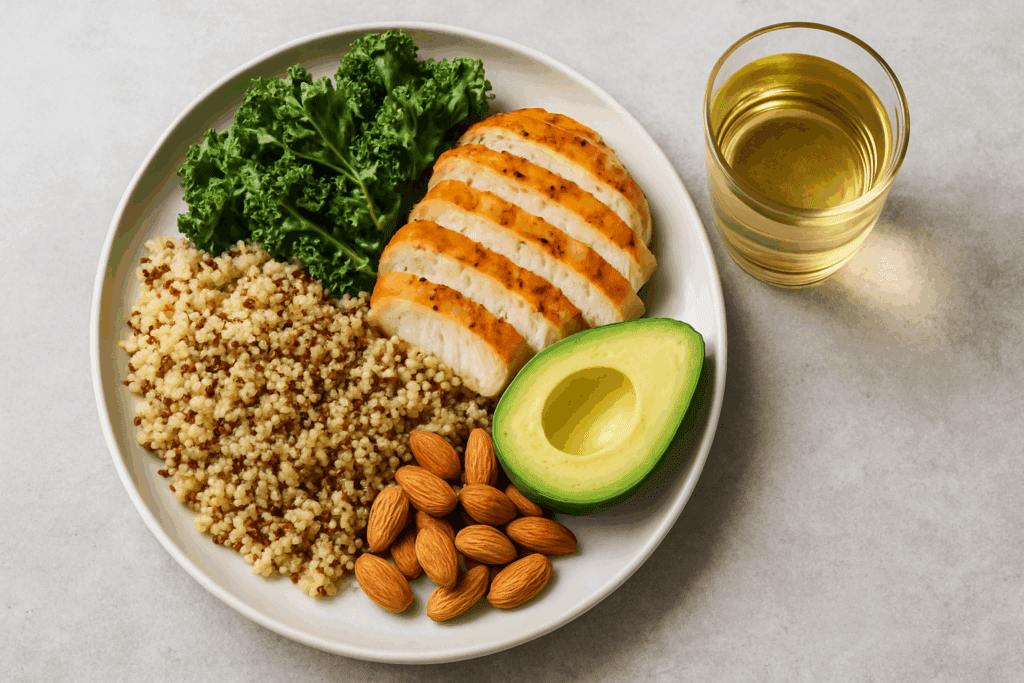Achieving meaningful weight loss in a short period of time is a challenge that many men face. Whether motivated by health concerns, fitness goals, or a personal desire for change, the quest for a sustainable weight loss plan for men often begins with understanding the biological, behavioral, and nutritional differences that influence male weight loss. With the right fat loss diet for men, it is possible to see measurable results in just 14 days. However, it requires more than generic advice or crash diets; it demands a scientifically informed approach that aligns with male physiology and lifestyle. In this article, we explore how men can lose weight in two weeks using a diet plan rooted in medical guidance, evidence-based nutrition, and a commitment to lasting wellness.
You may also like: Expert-Backed Weight Loss Tips for a Healthier Lifestyle: What You Need to Know for Long-Term Weight Control and Wellness
Understanding the Unique Physiology of Male Weight Loss
Men tend to lose weight differently than women due to a combination of hormonal factors, muscle mass, and metabolic rate. Testosterone plays a key role in shaping male body composition, contributing to greater lean muscle mass and a naturally higher resting metabolic rate. These biological advantages can support faster fat burning when paired with a proper weight loss programme tailored specifically to men.
However, these benefits also come with challenges. Many men store visceral fat—particularly around the abdomen—which increases the risk for cardiovascular disease, insulin resistance, and metabolic syndrome. A male nutrition plan must therefore do more than just promote calorie reduction; it must support healthy metabolism, target abdominal fat, and preserve lean mass. Unlike extreme weight loss methods that can result in muscle breakdown and nutritional deficiencies, an effective fat loss diet plan for male individuals needs to be nutrient-dense, protein-rich, and metabolically supportive.

Caloric Needs and Macronutrient Balance in a Weight Loss Diet Plan for Men
A successful diet plan for weight loss for male individuals begins with calculating daily caloric needs based on age, height, weight, activity level, and metabolic function. Creating a caloric deficit is essential for fat loss, but it must be done strategically to avoid compromising muscle integrity or energy levels. For most men, reducing daily intake by 500–750 calories can lead to safe and steady fat loss without extreme restriction.
Macronutrient distribution is equally important. A male weight loss diet should typically aim for 35–40% of calories from protein, 30–35% from healthy fats, and 25–30% from complex carbohydrates. This balance promotes satiety, preserves muscle mass, and ensures stable blood sugar levels. High-quality protein sources such as lean meats, eggs, Greek yogurt, legumes, and plant-based alternatives play a vital role in maintaining metabolic function and supporting recovery from physical activity. Healthy fats—especially omega-3s from fish and flaxseed—help reduce inflammation and support hormone regulation.
Carbohydrates should not be eliminated entirely, especially if men are engaging in resistance training or high-intensity workouts. Instead, focusing on fiber-rich, low-glycemic carbs such as oats, quinoa, lentils, and leafy greens can optimize energy without promoting fat storage. A properly designed body fat weight loss diet plan can reduce cravings, prevent energy crashes, and accelerate fat oxidation.
How Can You Lose Weight Fast in 2 Weeks? Setting Realistic and Achievable Goals
Many individuals ask how can you lose weight fast in 2 weeks and expect dramatic transformations. While it is possible to achieve meaningful results in this timeframe, it’s essential to set realistic expectations. Most health professionals recommend a weight loss of 1 to 2 pounds per week as safe and sustainable. However, due to water weight changes and the body’s initial adaptation to a new eating pattern, some men may lose up to 5 pounds or more in the first two weeks.
The focus should not be solely on the scale. Losing weight for men also includes reductions in waist circumference, improvements in energy levels, and better sleep quality. A holistic weight loss eating plan for men should emphasize progress over perfection, aiming for consistent behaviors rather than temporary fixes. By focusing on whole foods, portion control, hydration, and physical activity, men can initiate a fat-burning state that continues beyond the initial two-week mark.
The Foundation of a Fat Loss Diet Plan for Male Individuals
To build an effective fat loss diet for men, the emphasis must be on nutrient density, meal timing, and sustainable habits. Each meal should include a source of lean protein, a variety of vegetables, and a moderate amount of healthy fat. Breakfast might consist of scrambled eggs with spinach and avocado, while lunch could feature grilled chicken with quinoa and steamed broccoli. For dinner, a baked salmon fillet with roasted Brussels sprouts and sweet potato offers balance, satisfaction, and key micronutrients.
Snacking should be intentional and protein-forward. Examples include cottage cheese with sliced almonds, hard-boiled eggs, or a protein smoothie with unsweetened almond milk and berries. Avoiding refined sugars and ultra-processed snacks is critical, as these foods can derail even the most disciplined weight loss plan for men. Incorporating intermittent fasting or time-restricted eating may offer additional benefits for metabolic health, especially when paired with resistance training.
Hydration is another often-overlooked element of male weight loss. Drinking adequate water supports digestion, appetite regulation, and detoxification. Many men mistake thirst for hunger, leading to unnecessary calorie consumption. Aiming for at least half of one’s body weight in ounces of water per day can enhance the effectiveness of any weight loss programme.

The Role of Resistance Training and Cardio in Accelerating Fat Loss
While diet is foundational, physical activity significantly enhances the results of any fat loss diet for men. Resistance training, in particular, is essential for preserving and building lean muscle mass, which directly influences resting metabolic rate. Full-body workouts involving compound movements such as squats, deadlifts, bench presses, and pull-ups stimulate muscle fibers, burn calories, and promote long-term fat oxidation.
Cardiovascular exercise also plays a role in male weight loss, particularly when used strategically. High-intensity interval training (HIIT) has been shown to increase fat-burning potential and improve insulin sensitivity. Moderate-intensity cardio, such as brisk walking or cycling, supports cardiovascular health and can be incorporated as active recovery. When combined with a targeted diet plan for men, this exercise approach can produce significant results within two weeks.
Moreover, exercise supports emotional and psychological wellness, helping men stay focused and motivated. Hormones like dopamine and serotonin are naturally elevated through movement, which can reduce the temptation to rely on food for stress relief. For long-term success, a balanced approach that integrates both strength training and cardiovascular activity is ideal.

Diets for Guys to Lose Weight Without Starvation or Deprivation
Contrary to popular belief, effective diets for guys to lose weight do not require severe deprivation or monotonous food choices. In fact, extreme weight loss methods that promote rapid calorie cuts or eliminate entire food groups often backfire, leading to rebound weight gain, hormonal disruption, and nutrient deficiencies. A smarter approach is to create a flexible meal plan that allows for variety, satiety, and occasional indulgences without guilt.
This means including satisfying meals with herbs and spices for flavor, using different cooking techniques to keep meals interesting, and rotating food choices to prevent boredom. A weight loss diet plan for men can incorporate cultural preferences, dietary restrictions, and lifestyle demands without compromising results. When men enjoy their meals, they are more likely to stick to the plan and maintain consistency.
For example, allowing one planned indulgence meal per week can satisfy cravings and reduce the likelihood of binge eating. It also teaches men how to balance pleasure with purpose—a crucial skill in sustaining a long-term weight loss programme. The goal is to establish a relationship with food that is both healthy and enjoyable, rather than adversarial or restrictive.

Optimizing a Male Nutrition Plan for Hormonal Health and Energy
One of the often-overlooked aspects of a male nutrition plan is its impact on hormonal balance and vitality. Low testosterone, insulin resistance, and elevated cortisol levels can all sabotage fat loss efforts, especially when men are under stress or sleep-deprived. A properly designed weight loss plan for men addresses these concerns through strategic food choices, meal timing, and lifestyle habits.
Foods rich in zinc, magnesium, and vitamin D—such as oysters, pumpkin seeds, leafy greens, and fatty fish—can support testosterone production. Complex carbohydrates consumed post-workout can enhance glycogen replenishment and reduce cortisol. Adequate sleep, ideally 7 to 8 hours per night, is vital for maintaining metabolic and hormonal equilibrium.
Caffeine and alcohol intake should be monitored as well. While moderate caffeine can enhance performance and fat burning, excessive intake can elevate cortisol and interfere with sleep. Alcohol, on the other hand, provides empty calories and can suppress fat oxidation, making it counterproductive to any diet plan for weight loss for male individuals. By addressing these variables, men can optimize both physical and mental performance.

Meal Planning and Meal Prep: The Cornerstone of Consistency
One of the greatest predictors of success in any weight loss 2 weeks strategy is preparation. Men who take the time to plan and prepare meals in advance are less likely to make impulsive, unhealthy food choices. Meal prep removes the guesswork, making it easier to stay within calorie targets and ensure adequate nutrient intake.
Successful meal planning involves identifying go-to recipes, shopping for whole ingredients, and setting aside time each week to cook and store meals. Batch cooking proteins, chopping vegetables, and portioning meals into containers can save time and eliminate the temptation to order takeout or rely on processed snacks. A consistent routine, supported by a structured male nutrition plan, cultivates discipline and builds momentum.
Technology can also aid in this process. Using meal tracking apps to log food intake, monitor macronutrients, and track progress can provide valuable insights and accountability. Over time, these habits become second nature, reinforcing the behaviors that support long-term weight management.
Redefining Success: Beyond the Scale and Into the Future
Losing weight for men is often framed around numbers—pounds lost, inches dropped, or body fat percentages reduced. While these metrics are useful, they are not the only indicators of success. A body fat weight loss diet plan should also result in improved vitality, greater confidence, better digestion, enhanced sleep, and a stronger immune response. These are the hallmarks of a truly effective weight loss programme.
The journey to lose weight men often begins with a desire for change, but it continues with a commitment to self-respect and wellness. Recognizing the interplay between food, movement, stress, and sleep allows men to approach weight loss with greater intention and clarity. As habits solidify and knowledge grows, men gain the tools to maintain a healthy weight and prevent future setbacks.
It is also important to note that the support of healthcare providers, registered dietitians, or fitness coaches can make a significant difference. Expert guidance ensures that dietary strategies are evidence-based, personalized, and sustainable. This is especially important for men with underlying health conditions or specific performance goals.
The Lasting Impact of a Body Fat Weight Loss Diet Plan Designed for Men
By understanding the science behind male weight loss and applying practical, medically grounded strategies, men can take control of their health and create lasting transformation. A fat loss diet plan for men is not about quick fixes or punishing regimens. It is about building a lifestyle that aligns with one’s physiology, values, and aspirations. When men adopt a diet plan for men that is rooted in balance, variety, and structure, they lay the groundwork for long-term success.
The two-week timeframe offers a powerful starting point, especially for those wondering how to lose weight in two weeks. However, the real transformation occurs when short-term actions evolve into lifelong habits. With the right mindset, support system, and weight loss eating plan for men, sustainable fat loss becomes not only possible but inevitable.
Frequently Asked Questions: Best Diet Plan for Weight Loss in Men
1. What are the psychological barriers that often prevent men from sticking to a weight loss plan for men?
Many men struggle with consistency in a weight loss plan for men due to deeply rooted psychological habits formed around food, stress, and self-image. Societal pressures often discourage emotional openness, leading men to cope with stress through unhealthy eating rather than seeking support. Additionally, all-or-nothing thinking can sabotage progress—missing one workout or indulging in one unhealthy meal may cause some to abandon their entire weight loss programme. Building awareness around these patterns and integrating mindset coaching or cognitive behavioral therapy can help address the emotional side of male weight loss. Long-term success depends on aligning mental resilience with a well-structured diet plan for weight loss for male individuals.
2. Are extreme weight loss methods ever safe or advisable for men trying to lose weight in two weeks?
Extreme weight loss methods may offer rapid results, but they often come at a cost to metabolic health, hormone balance, and muscle preservation. For men aiming to lose weight in two weeks, it’s important to recognize that these methods frequently involve water loss, not fat loss, and can undermine the sustainability of a male nutrition plan. While supervised medical interventions—such as very-low-calorie diets—may be appropriate in clinical settings, most men are better served by adopting a balanced fat loss diet for men that promotes long-term progress. Prioritizing nutrient density, protein intake, and portion control is a safer and more effective alternative than crash dieting. Ultimately, weight loss for men should prioritize health over speed.
3. How can meal timing influence the success of a weight loss diet plan for men?
Meal timing plays a significant role in how effectively the body metabolizes nutrients and regulates appetite. Intermittent fasting protocols or time-restricted eating windows can enhance insulin sensitivity and reduce overall calorie consumption, making them valuable additions to a weight loss eating plan for men. For example, consuming meals within an 8- to 10-hour window has been shown to improve metabolic markers in overweight men. Aligning meals with circadian rhythms—eating more calories earlier in the day and fewer at night—may also help support a fat loss diet plan for male individuals. Strategic timing can enhance fat-burning without increasing caloric restriction.
4. What role does sleep play in losing weight for men, and how can poor sleep derail progress?
Sleep is a critical yet often overlooked factor in any weight loss programme, particularly for men. Inadequate or poor-quality sleep disrupts hormonal signals related to hunger and satiety, specifically ghrelin and leptin, which can lead to overeating. Additionally, sleep deprivation increases cortisol levels, promoting abdominal fat storage and reducing testosterone, which hinders muscle maintenance during male weight loss efforts. A consistent sleep schedule of 7 to 8 hours per night supports recovery, hormone function, and metabolic balance. Optimizing sleep hygiene should be considered as essential as diet and exercise when aiming to lose weight men safely and effectively.
5. How can men navigate social settings while following a structured diet plan for men?
Navigating social events while adhering to a weight loss diet plan for men requires both preparation and mindset flexibility. Men can benefit from reviewing menus in advance, choosing lean proteins and vegetables, and avoiding excess alcohol. Communicating dietary goals with friends or partners often leads to increased support and reduced peer pressure. In cases where indulgences are unavoidable, planning for those moments within the context of a larger fat loss diet for men can prevent guilt or derailment. Remember, consistency—not perfection—is the hallmark of successful male weight loss.
6. Are there any supplements that can enhance results when following a fat loss diet plan for male individuals?
Certain supplements may complement a body fat weight loss diet plan when used appropriately, though they should never replace a balanced diet. High-quality whey or plant-based protein powders can help meet protein targets essential for preserving muscle mass. Omega-3 fatty acids support inflammation reduction and hormone balance, while fiber supplements like psyllium husk may aid in satiety and digestion. Caffeine, used strategically before workouts, can enhance energy and fat oxidation, but excessive intake should be avoided. Men should always consult healthcare professionals before integrating supplements into a weight loss plan for men to ensure safety and effectiveness.
7. What is the long-term impact of following a weight loss 2 weeks strategy, and how can results be maintained?
Short-term efforts to lose weight in two weeks can provide valuable momentum, but the key to lasting success lies in post-diet planning. Without a transition strategy, many men experience rebound weight gain due to returning to old eating habits or stopping physical activity. A weight loss eating plan for men must evolve into a maintenance plan that continues to prioritize protein, whole foods, and regular movement. Incorporating lifestyle strategies such as mindful eating, weekly meal prep, and periodic health check-ins can extend results well beyond the initial weight loss 2 weeks period. Sustainable transformation requires more than dietary discipline; it demands lifestyle integration.
8. How do cultural expectations around masculinity influence adherence to diets for guys to lose weight?
Cultural norms often encourage men to prioritize strength and stoicism over vulnerability, which can hinder help-seeking behavior and openness about health challenges. Many men avoid structured diets for guys to lose weight because they perceive them as restrictive or emasculating. Reframing dietary changes as strength-enhancing strategies aligned with athletic performance or vitality can improve buy-in. Fitness communities that emphasize camaraderie and personal growth can also support adherence to a diet plan for men. Recognizing and challenging societal stereotypes may be essential in helping men embrace the psychological and physical aspects of long-term male weight loss.
9. What are early warning signs that a chosen weight loss plan for men may be too aggressive or unsustainable?
Red flags of an unsustainable weight loss plan for men include chronic fatigue, irritability, disrupted sleep, and loss of muscle tone. If a plan heavily restricts calories or eliminates entire food groups, it may qualify as one of the more extreme weight loss methods that risks nutritional deficiencies and metabolic slowdown. Sustainable fat loss diet plans for male individuals should foster steady energy, balanced mood, and progressive fitness improvements. If a man finds himself obsessing over food or experiencing intense cravings, the plan may need to be adjusted for psychological and physiological balance. Monitoring both physical and emotional markers is essential in evaluating the efficacy and safety of any weight loss programme.
10. How can technology support adherence to a male nutrition plan and amplify results?
Technology can play a transformative role in supporting a male nutrition plan by offering tracking, accountability, and personalized feedback. Apps like MyFitnessPal or Cronometer allow men to log meals, monitor macronutrients, and spot trends in caloric intake or exercise output. Wearable devices like fitness trackers or smartwatches provide real-time data on heart rate, sleep, and physical activity, helping men stay aligned with their fat loss diet for men goals. Some platforms also offer AI-driven coaching or community forums that foster motivation and education. When used consistently, tech tools can elevate the effectiveness of any body fat weight loss diet plan by transforming abstract goals into measurable outcomes.
A New Chapter in Male Wellness: Reflecting on Progress and Moving Forward
Ultimately, the best weight loss plan for men is one that recognizes the complexities of the human body while simplifying the path toward change. A well-structured diet plan for weight loss for male individuals respects both the science of nutrition and the art of behavioral change. It encourages consistency, cultivates resilience, and fosters a deeper connection to one’s health.
For any man seeking to lose weight in two weeks, the key lies in blending precision with practicality. From tailoring a male nutrition plan to one’s metabolic needs, to navigating stress and social pressures, to optimizing food choices that fuel strength and vitality—every decision matters. In time, the pursuit of weight loss 2 weeks becomes a gateway to something far more powerful: lifelong wellness. And that, perhaps, is the most meaningful transformation of all.
Further Reading:
Best 4-Week Fat-Burning Plan for Men


